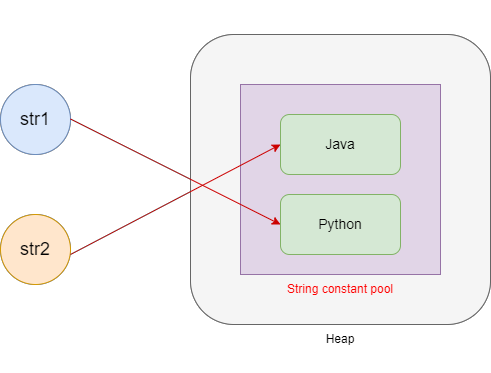Why Are Strings Immutable in Java? Exploring the Style Decisions
Why Are Strings Immutable in Java? Exploring the Style Decisions
Blog Article
What Is Unalterable Strings and How It Functions
In the world of programming, understanding the principle of unalterable strings is paramount for creating robust and secure applications. Unalterable strings describe strings that can not be changed after they are developed, making sure information honesty and predictability within the code. This basic principle plays an essential role in different programming languages and uses an unique method to managing information. By exploring the complexities of how immutable strings function, one can discover a world of advantages and possibilities that can raise the top quality and performance of software program growth.
The Essentials of Immutable Strings
Unalterable strings, as an essential concept in programming, are character series that can not be altered once they are created. This indicates that as soon as a string is assigned a worth, that value can not be modified. In languages like Python and Java, strings are unalterable objects, causing various effects in regards to memory administration and data honesty.
One of the essential benefits of immutable strings is that they supply a feeling of security in data manipulation. Given that the content of an immutable string can not be modified, it makes sure that the original data continues to be intact, minimizing the risk of unintended adjustments throughout program implementation (Why are strings immutable in Java?). This residential property also simplifies debugging processes, as developers can rely on that once a string is defined, its value will certainly not be inadvertently modified
When a brand-new string is developed based on an existing one, rather than modifying the original string, the new worth is saved independently. In general, understanding the basics of unalterable strings is vital for understanding shows concepts and maximizing code performance.
Benefits of Immutable Strings
Structure upon the security and performance benefits of immutable strings, their benefits encompass improving code integrity and streamlining simultaneous programs jobs. By being unalterable, strings can not be modified after production, which eliminates the risk of unintended changes in the data they save. This integral immutability makes certain that once a string is developed, its value continues to be constant throughout the program's execution, reducing the chances of insects triggered by unanticipated alterations.
Furthermore, unalterable strings contribute to code dependability by making it much easier to reason concerning the state of a program. Considering that strings can not be changed, designers can rely on that a string will certainly constantly hold the same value, streamlining debugging and upkeep initiatives. This predictability brings about more reputable and stable codebases.

Implementation in Programs Languages
Within various programs languages, the incorporation of immutable strings is a fundamental aspect that affects exactly how information is handled and manipulated within code structures. The implementation of immutable strings differs throughout various programming languages, with each language supplying its very own mechanisms to support this principle.

On the other hand, languages like C read this and C++ do not have integrated assistance for immutable strings. Developers in these languages need to manually execute immutability by imposing rules within their code to prevent straight modifications to string objects.
Ideal Practices for Dealing With Unalterable Strings
When taking care of unalterable strings in shows languages like Java and Python, sticking to best techniques ensures safe and reliable data manipulation. One of the key best methods is to utilize StringBuilder or StringBuffer instead of straight controling strings, particularly when taking care of substantial concatenation procedures. These courses offer mutable alternatives for string adjustment, aiding to prevent unneeded memory allowances and boosting performance.
One more ideal method is to utilize string interpolation or format operates offered by the language rather than hand-operated concatenation. This not just enhances readability but also aids in protecting against common pitfalls such as unintentional string alterations. Additionally, when collaborating with delicate information such as passwords or API secrets, it is vital to stay clear of storing them as plain text in immutable strings. Making use of secure storage mechanisms like char selections or specialized libraries for dealing with sensitive details helps minimize security threats linked with unalterable strings.
Real-world Applications and Instances
Exploring practical executions of unalterable strings in different markets reveals their significant effect on data stability and system reliability. In the healthcare industry, unalterable strings play a crucial function in making sure the protection and privacy of person information. By protecting against unauthorized adjustments to sensitive details such as clinical documents and prescriptions, immutable strings help preserve conformity with stringent personal privacy guidelines like HIPAA.
Banks additionally gain from the immutable nature of strings to improve the protection of consumer data and purchase records. Immutable strings assist stop fraud and unauthorized changes to monetary information, supplying a robust try these out protection versus cyber threats and making sure the trust fund and self-confidence of customers.

Final Thought
Finest techniques for functioning with unalterable strings consist of preventing direct modifications and utilizing approaches that return brand-new string objects. Real-world applications of unalterable strings consist of data encryption, caching, and string adjustment tasks.
Immutable strings refer to strings that can not be modified after they are created, making certain information honesty and predictability within the code. When a brand-new string is created based on an existing one, instead than changing the initial string, the brand-new value is kept individually.In languages like Java and Python, strings are unalterable by default, meaning that as soon as a string item is developed, its value can not be changed - Why are strings immutable in Java?. Ideal techniques for working with immutable strings consist of avoiding direct adjustments and utilizing methods that return new string items. Real-world applications of unalterable strings include information file encryption, caching, and string manipulation jobs
Report this page